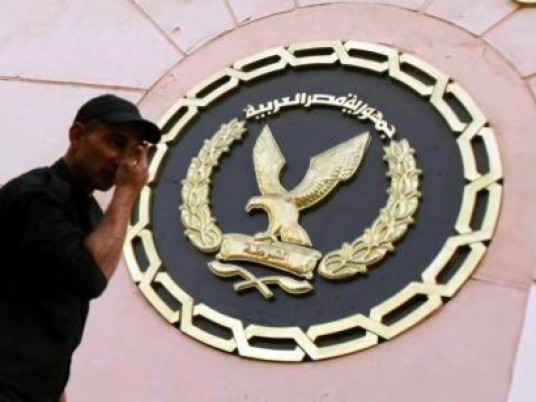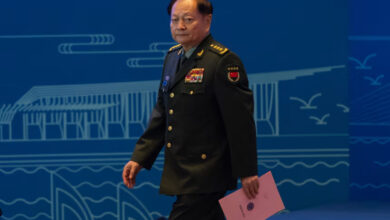Revolutions are tumultuous. This is the third article in a series which will tackle the tumult by discussing the obstacles standing in the way of the full realization of the revolution’s goals. The series' title should not be seen as a dismissal of the colossal accomplishments of the revolution but rather a desire to see them enshrined and sustained in the new republic of Egypt.
The night’s events in Imbaba began with a Salafi flash-mob demonstration in front of the St. Mina church demanding the release of a Coptic woman convert to Islam. Christian and Muslim youth converged on the church to defend it against a possible attack. As the fires grew in the courtyard of the church, the voices of crowds reverberated into the night sky, “Muslim, Christian, One Hand.” At the end of the night, the streets around the church had been turned into battlefields, blood had been spilled and the smell of smoldering ash rose in the air. Fingers of blame were pointing in every direction.
Christians accused Salafis, and baltageya (thugs), Salafis accused Christians and baltageya, SCAF condemned the baltageya, the government said it will take decisive action against Muslim and Christian baltageya. In a span of 24 hours everyone in Egypt was a likely baltagy, from the urban poor to Coptic Pope Shenouda. But the real question is who did the baltageya accuse? So I went on a quest to locate a baltagy to get his opinion. Sadly, I learned that the baltageya have no office, no phone number, no representatives, no websites, no email addresses, no Facebook profiles or twitter feeds (spoofs aside). No one has come forward to admit being a member of this elite force of divisiveness. So there is no one to speak for the baltageya. This is because they have no names, faces or leaders. So who are these invisible baltageya that seem to pose such a major threat to the contiguity of the Egyptian revolution? Arguably, they are now the most influential group in Egypt post-Mubarak.
They are part of the storyline in every act of violence in Egypt since the revolution. They were accused of the attacks on the churches in Atfeeh, Imbaba and the clashes in el-Zabaleen two months ago. They are condemned publicly as the perpetrators of attacks against public figures such as that which prevented reform advocate Mohamed ElBaradei from voting during the constitutional amendments. While they are often described as a professional class of violent thugs, the baltageya likely come in two or more varieties. Some are institutionalized into the state security apparatus making them indistinguishable from the surveillance force of the plainclothes police. Others are fearless, time- and battle-tested freelance operators who can act as an unofficial urban mercenary force. The former are an unconventional instrument of law enforcement which is immune from scrutiny, the latter a loose force that can provide its services to the highest bidder but shoulder all the public disdain.
Even before the revolution, the baltageya have been a mainstay in Egyptian cinema and television where they exist and function outside the law. They are often depicted as part of a parallel legal system — a missing link between elite hegemons and the unruly masses. As in reality, they did the dirty work of the police and the powerful. In a stable police state, the baltageya are known entities, individuals to be feared and revered. But in Egypt post-11 February, they have become anonymous, the masked actors on behalf of what the government, military, media and public now call generically, the “hidden hands.” While they may eventually be arrested, tried and sentenced for crimes, they are insulated by layers of misdirection making their sponsors practically untraceable.
The only thing more serious than what the so-called baltageya do is what they represent. One cannot understand their impact without understanding the discourse behind their representation. The word baltagy in Arabic refers to “he who bears an axe” with the old Turkish suffix modification still common in many parts of the Arab world. It has been used for decades in the Egyptian vernacular with negative connotations implying hired thugs and members of violent urban gangs. Today it has become what linguists call a “floating signifier,” a word that doesn’t point to any actual or agreed upon meaning. The term itself undermines any other identity since it does not communicate any sociological, political, cultural, economic, ideological, or religious meaning. The only common usage for the term suggests absolute opportunism outside of any basic humanitarian principles, values or ethics. Yet it is precisely this absence of a denotative meaning that makes the term most dangerous.
And incidentally, the confusion in its meaning coincides with the increase in its use. Out of curiosity, I did a quick search of the word baltageya in the Arabic press for the last few years. While this is by no means an accurate content or discourse analysis, it is nevertheless telling about the usage of the term. In 2008, the word baltageya was used in a total of 105 articles and the following year, the number increased to 196. It wasn’t until 2010 when baltageya came into regular usage when it featured in 896 articles, the majority of these published in November and December during and after the parliamentary elections. The term was used to describe the regime’s intimidation of the public and opposition candidates during this period. Yet, 2011 has proven to be the year of baltageya as the term appeared in 3,809 articles between January and May, a four fold increase in just a few months. What 11 September did to the usage of the term “terrorists,” the Egyptian revolution did for the word baltageya.
During the 18 days of protests that toppled Mubarak, the term that was a weapon in the hands of the regime’s opponents was being hijacked by the government to characterize the protesters. The sheer negativity of the term in colloquial Egyptian made it a useful instrument to discredit the “other.” Since 11 February, with the term still devoid of actual meaning, it has become legalized. The new authority in Egypt today and only institution above the law, the Supreme Council for the Armed Forces (SCAF), has appropriated it to critique and sentence anyone it sees fit. Extrajudicial military court sentences have been handed down for blogging, public expressions and calls to demonstrate and strike. Today, the newly-activated “Law of Baltaga” can be used in a manner akin to the Emergency Law and the Penal code against anyone who might be perceived as a threat to the security of the state even in the cases of so-called “online baltaga!”
The move to install a legal condition for an undefined category was swift, forgetting what precipitated it. Baltageya are actually victims of the Mubarak system. They are a product of the failing neoliberal economic project and its polarization of the rich and poor. They are those who were forced into a life of commissioned crime by the disappearance of the middle class and the state’s need to maintain order despite the drastic disequilibrium. Furthermore, the NDP had effectively institutionalized them to facilitate the conditions necessary for its consolidation of power — from intimidation of opposition election candidates to maintaining conformity in Cairo’s combustible and underprivileged slums, to protecting the physical assets of the powerful and wealthy, to instilling a general state of fear. Take the infamous “Battle of the Camel” where poor, desperate and misinformed camel and horse riders were transformed into baltageya with food, money and the instructions to attack what they were told was a demonstration responsible for the tourism slump that cost them their livelihoods. This goes to the core of the baltageya phenomenon. Rather than being seen as natural-born criminals whose intent and conviction is for violence, they must be viewed as tools not perpetrators, the product of a socioeconomic catastrophe.
The true baltageya are those who will not and cannot be tried using the Law of Baltaga, but rather will be protected by it as the toughened underprivileged pragmatists they hire take the blame and the country pays the price. In Egypt today, no evidence is necessary to render a protester or a petty thief a baltagy, but those who profit in the billions from illegal business dealings must undergo elaborate inconclusive investigations. Sadly, an untraceable pact seems to have emerged between those too desperate to operate legally and those who desperately use the law to operate illegally. What is at stake in this alliance is no less than the future of Egypt if the latter are not stopped.
The greatest danger posed by baltageya is not that they instill a state of uncertainty, fear and paranoia in the country, or that they create a culture of violence, or that they foment divisions among the revolutionaries (such as the recent sectarianism), or that they distract from the revolution’s priorities or that they might be ushering, through their actions, a virulent form of military totalitarianism in Egyptian. Instead, the baltageya are most frightening because their very existence, at least as a rhetorical and legal construction, creates a space above the law. Beyond simply serving as a scapegoat which can be easily demonized, vilified, and eventually punished, they are a shroud which conceals the real actors who sponsor unrest in the country. With the sentencing of every so-called baltagy, a funder and endorser of instability in Egypt escapes justice. As the witch-hunt unfolds against baltageya, those intent on assassinating the revolution remain at-large.
Adel Iskandar is a media scholar and lecturer at Georgetown University.




